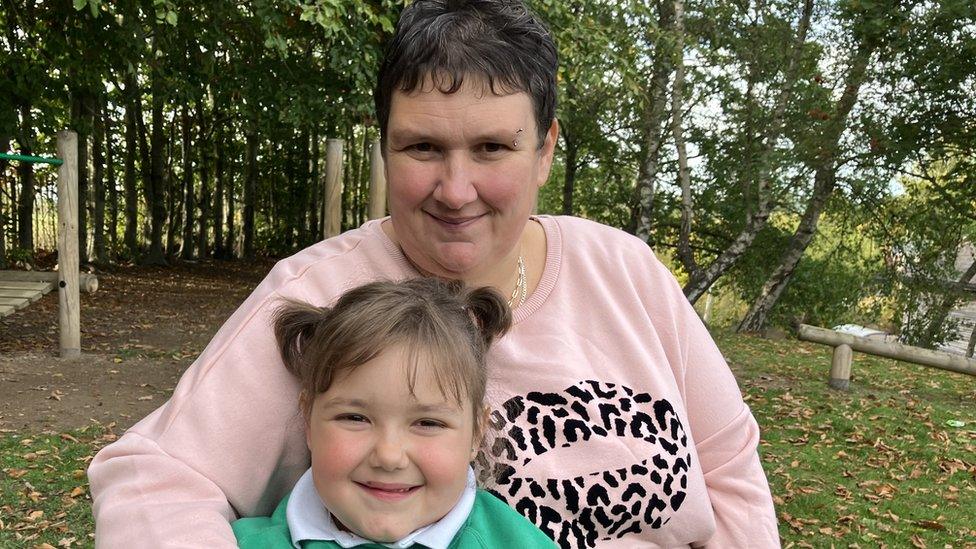Cost of living: 'I couldn't tell the real bills from scams'
- Published

People in debt have been swamped with demands via letter, phone and text, leaving them "unable to tell between real bills and scams".
The Money and Mental Health Policy Institute says demands from debt collectors are leaving some people unable to see a way out of trouble as the cost of living soars.
The charity is calling for limits on how often creditors can contact people.
The government said it had put in extra support for those in problem debt.
Rob was one of those who faced a mountain of demands. His divorce had left him suffering from anxiety and depression, which in turn led to him struggling with his finances.
One debt was manageable, but then his financial problems spiralled and so did the letters, emails and texts.
"They would come via multiple channels, but I could not work out what was real and what was a scam. I was afraid to answer the phone. I could not sort out who I owed money to," he told the BBC.
His mental state meant he would panic or "blank everything", meaning he would not talk to anyone, even though he understands why creditors needed to get in touch.
"Different companies dealt with it in different ways, but some were quite aggressive," he said.

Rob was far from alone in his experience. Others told the institute that this barrage of messages could leave them feeling bombarded, bullied and unable to see a way out of their situation. For some, it could contribute to suicidal thoughts.
One described how on a single day last month he received seven contacts in seven hours from a single debt collection agency, including two text messages, two emails, a letter and two phone calls.
The Money and Mental Health Policy Institute criticised a lack of clear legal rules in the UK limiting how often people could be contacted about overdue bills.
Guidance from the City regulator, the Financial Conduct Authority, states that creditors and debt collectors should not contact people in arrears "at unreasonable intervals". However, a timescale is not stipulated, unlike in the US where creditors are allowed to call debtors seven times in one week.
Martin Lewis, founder of the charity and Moneysavingexpert, said: "We know that being bombarded with letters, calls and threats of court action from debt collectors can lead people to feel hopeless, helpless and even contribute to people becoming suicidal.
"So the sooner there are specific protections put in place to limit how and how often debt collectors can contact people about missed payments the better."
Separate figures published by the Office for National Statistics (ONS), external on Tuesday highlighted the money and health implications of the rising cost of living in Britain.
Some 32% of people it surveyed who were experiencing moderate to severe depressive symptoms reported that they had to borrow more money or use more credit than usual in the last month compared with a year ago. For those with no or mild depressive symptoms, it was 18%.
Additionally, about one in four of those struggling with energy bills, rent or mortgage payments experienced moderate to severe depressive symptoms - much higher than the proportion of those who had no problems in paying.
Dr Anita Raja, a Birmingham-based GP, said: "My biggest concern is the impact of such high inflation on the mental wellbeing of people. We are now seeing more patients call in due to stress-related issues, much of which is down to money worries and the cost of living crisis. This, of course, is having a knock-on effect on the healthcare system and NHS."
Rob has now turned his life around after therapy. His finances are in better shape - despite being stretched by soaring prices - and he is looking for work.
"I would urge anyone in that situation to talk to their support worker or, if they don't have one, to contact Citizens Advice, and also look into the [government's] breathing space scheme," he said.
A spokesman for the Treasury said: "Through our breathing space scheme [in England and Wales], we have protected over 100,000 people who are unable to afford their debt repayments by pausing enforcement action, creditor contact and most interest, fees and charges for a 60-day period, giving them time to find a debt solution that works for them."
In 2020, the government introduced legislation which updated the content of default notices sent to customers who are behind on payments, to make them less intimidating and easier to understand.

Guide to dealing with debts
Work out how much you owe, who to, and how much you need to pay each month
Identify your most urgent debts. Rent or mortgage, energy and council tax are called priority debts as there can be serious consequences if you do not pay them, and so they should be paid first
Calculate how much you can cover in debt repayments. Create a budget by adding up your essential living costs like food and housing, and taking these away from any income such as your wage or benefits you receive
See how you could boost your income, primarily by checking what benefits you are entitled to, and whether you are eligible for a council tax reduction or a lower tariff on your broadband or TV package
If you think you cannot pay your debts or are finding dealing with them overwhelming, seek support straightaway. You are not alone and there is help available. A trained debt adviser can talk you through the options available
Source: Citizens Advice


- Published12 October 2022

- Published30 November 2022

- Published15 February 2024
